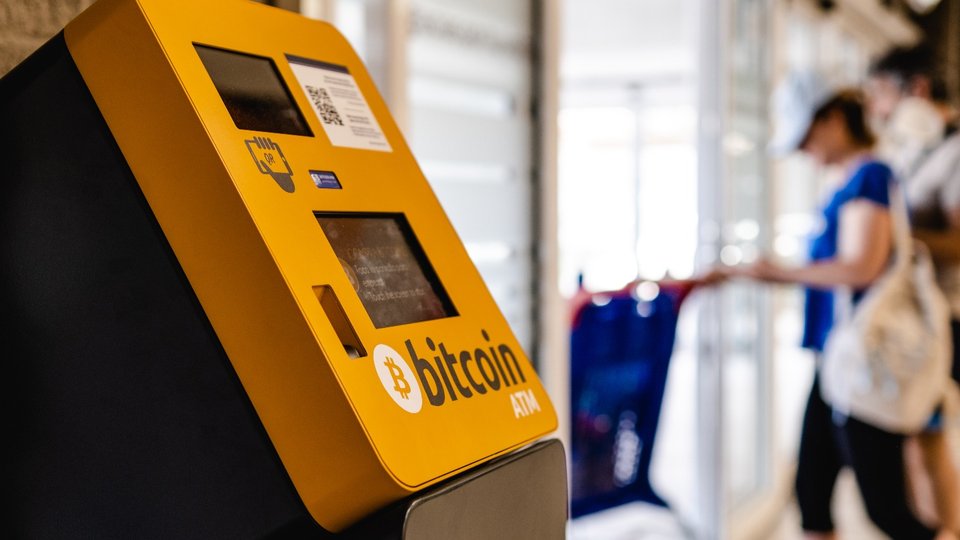Payments
Bitcoin ATMs have been in the news lately…for bad reasons. What’s the deal with bitcoin ATMs?

Photo: Adobe Stock
April 18, 2025 by Bradley Cooper — Editor, ATM Marketplace & Food Truck Operator
Bitcoin ATMs have been in the news lately, and not for the right reasons. The Arizona House of Representatives introduced a bill to combat crypto ATM fraud, while Stillwater, Minnesotahas banned the devices entirely. Nebraska has signed a crypto ATM law, and there has been calls for on the federal level for greater oversight.
Overseas, an Australian regulator has put bitcoin ATM operators on notice for allegedly failing to have the right anti-money laundering tools in place. So, what’s going on? What’s the deal with bitcoin ATMs?
Scams
The simplest answer is that scammers are using bitcoin ATMs. A scammer will contact a victim and state that due to some circumstance, whether it be an unpaid bill, unpaid taxes to the IRS or something else that the victim needs to deposit funds into a bitcoin ATM.
The scammer will direct the victim to send the funds to one or multiple bitcoin wallets controlled by the scammer. Although bitcoin ATMs will display warnings not to send money to any wallet they do not control, the scammer will convince the victim to ignore these warnings.
From there, the victim has very little recourse to redress the lost funds. It is incredibly difficult to recover the bitcoin funds, and legally the bitcoin ATM operator does not have to turn over the cash deposited into the machine as transactions are nonrefundable.
This led to a legal battle in McLennan County, Texas when a sheriff opened up a bitcoin ATM to return money that an 82 year old woman had deposited into it at the behest of a scammer. Bitcoin Depot fired a lawsuit seeking a return of the $15,000, and a Texas judge agreed.
With the onset of generative AI, scams have increased in complexity and believability, which has led to more successful fraud at the bitcoin ATMs.
Another aspect to all of this is that senior citizens are often not aware of how cryptocurrency functions, and as a result are much easier for scammers to take advantage of.
Protection
Local, state and federal legislatures are pushing for a variety of tools to protect customers from crypto ATM scams including:
- Daily limits on transactions for new users.
- A refund process for victims.
- More preventative measures on the operator side.
- Refunds for transaction fees.
In other words, regulators are attempting to craft standards that protect consumers who currently have very limited options to redress loss from scams.
With Nebraska’s law: the Controllable Electronic Record Fund Prevention Act, there is a $2,000 daily cap for new users, and the ability to receive a full refund for all fraud reported within 90 days.
A bill proposed in the Senate by Illinois Sen. Dick Durbin would also put a $2,00 daily limit for new users, along with full refunds. It also calls on bitcoin operators to contact new customers who attempt to spend more than $500.
What should bitcoin ATM operators do?
Bitcoin ATM operators need to take proactive steps to rectify this issue. Otherwise, they may find their products severely restricted or outright banned in some localities.
For example, bitcoin ATMs should consider adding more restrictions to new users from daily transaction limits to making calls to confirm their accounts and more. The companies can also flag large transactions for review and not allow the funds to be sent immediately to the wallets.
Bitcoin ATMs can also work with local senior citizens organizations to craft anti-scam messaging on the machines that are most effective in stopping scammers in their tracks.
Companies can also create goodwill by adding refund options for victims of fraud. This can be frustrating as operators rightly point out it is not their fault that scammers use their machines, but it is a hurdle the industry has to overcome.
Retailers have also had to deal with this issue, as scammers have often tried to get victims to purchase large quantities of gift cards at retail stores. By training employees to spot victims of these scams, retailers can help prevent it. Bitcoin ATM operators should do the same, such as by contacting new customers.
Ultimately, this isn’t the first reputation crisis cryptocurrency has endured, and it won’t be the last. Bitcoin ATM operators can however mitigate this issue by showcasing proactive solutions to the public.
About Bradley Cooper


Leave a Reply